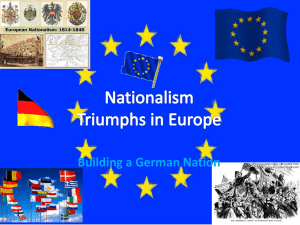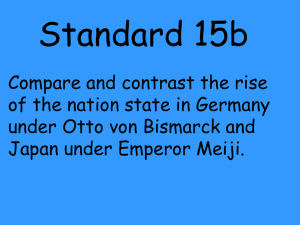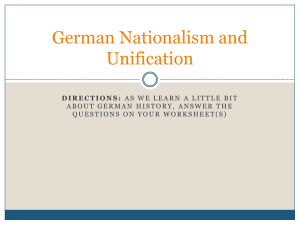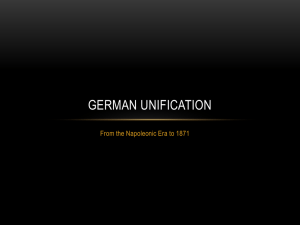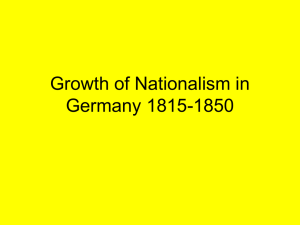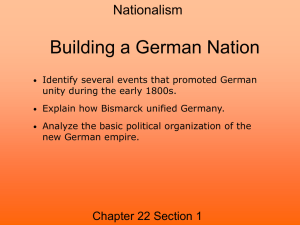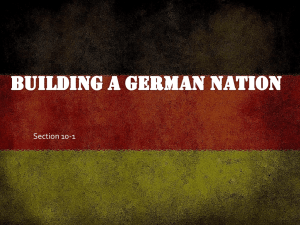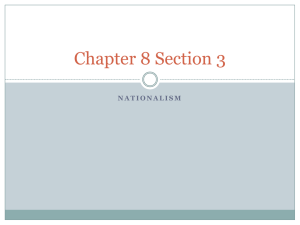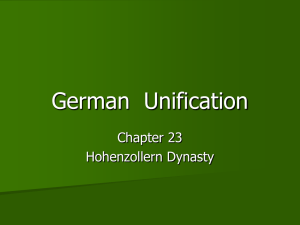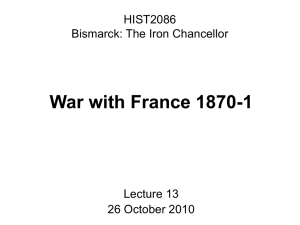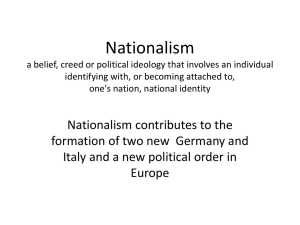Ch10Sec1
advertisement
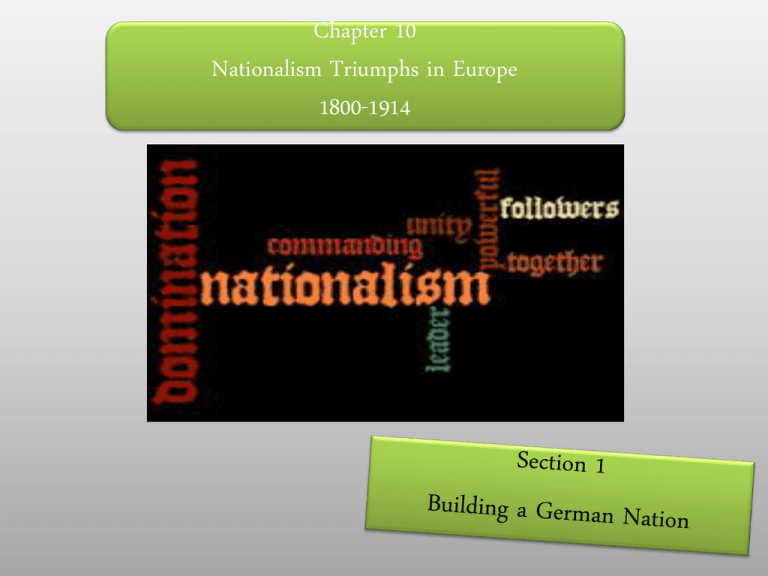
Chapter 10 Nationalism Triumphs in Europe 1800-1914 Lesson Objectives By the end of this lesson you will be able to: • Identify several events that sparked German unity during the early 1800s. • Explain how Bismarck unified Germany • Analyze the basic political organization of the new German empire. Taking Initial Steps Toward Unity In the early 1800s, German-speaking people lived in a number of small and medium-sized states as well as in Prussia and the Austrian Hapsburg Empire. Napoleon’s invasions unleashed new forces in these territories. Napoleon Raids German Lands Between 1806 and 1812, Napoleon made important territorial chances in German-speaking lands. He annexed lands along the Rhine River for France. He dissolved the Holy Roman Empire by forcing the emperor of Austria to agree to the lesser title of king. He also organized a number of German states into the Rhine Confederation. At first, some Germans welcomed the French emperor as a hero because of his new ways of thinking. Napoleon encouraged freeing the serfs, made trade easier, and abolished laws against Jews. However, not all Germans appreciated Napoleon and his changes. As people fought to free their lands from French rule, they began to demand a unified German state. Eventually the Germans were able to defeat the French and drive out Napoleon. This victory only made the Germans want to unify even more. At the Congress of Vienna the Germans asked for permission to dismantle the government of each German state. The committee denied their request and instead created the German Confederation, which was a weak alliance headed by Austria. Economic Changes Promote Unity In the 1830s, Prussia created an economic union called the Zollverein. This union created free trade between German states. Still, Germany remained politically separated. In 1884, liberals met at the Frankfurt Assembly and demanded German political unity. They offered the throne of a united German state to Frederick William IV of Prussia. The Prussian ruler, however, rejected the notion of a throne offered by the people. Bismarck United Germany A landowning noble from Prussia named Otto Von Bismarck succeeded where others had failed. Bismarck’s resume: *Served Prussia as a diplomat in Russia & France *Promoted to prime minister in 1862 by King William I. *By 1872, he became chancellor, or the highest official of a monarch, and had used his influence to unite the German states under Prussian rule. Learning Check: Go to page 331 on the text and answer the three map skills questions on the bottom of the map. Realpolitik The German word “realpolitik” can be translated to: realistic politics based on the needs of the state. Bismarck’s success was due to this idea. Even though Bismarck was responsible for unifying Germany, his loyalty was more Prussian than German. Bismarck hoped that by unifying Germany, he would bring more power to the dynasty of Prussia. Strengthening the Army As Prussia’s prime minister, Bismarck built up the Prussian army. With a powerful, well-equipped military, he was ready to expand the Prussian empire. Within the next ten years, Prussia engaged in 3 separate wars. Each one increasing the power of the Prussians and German unity. Prussia declares war with Denmark and Austria At first, Bismarck formed an alliance with Austria in 1864. Prussia and Austria went on to seize the provinces of Schleswig and Holstein from Denmark. Austria was given Holstein and Prussia was given Schleswig. In 1866, Bismarck invented an excuse to attack Austria. The Austro-Prussia War lasted just seven weeks and ended in a decisive Prussian victory. Prussia then annexed several other north German states. Bismarck dissolved the Austrian-led German Confederation and created a new confederation dominated by Prussia. France Declares War on Prussia The Prussian victory over Austria angered Napoleon. A growing rivalry between the two nations led to the Franco-Prussian War of 1870. A superior Prussian force, supported by troops from other German states, smashed the badly organized and poorly supplied French soldiers. Napoleon surrendered within a few weeks. Birth of the German Empire Excited by the victory over France, princes from the southern and northern German states persuaded William I of Prussia to take the title of Kaiser or emperor. IN January of 1871, German nationalists celebrated the birth of the second Reich or empire. A constitution drafted by Bismarck set up a two-house legislature. The Upper house was appointed by the rulers of the German states and the lower house was elected by universal male suffrage.
